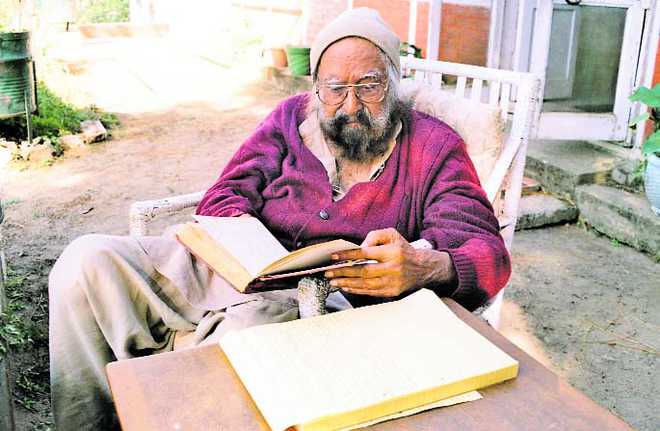
FOND MEMORIEs: The pieces in the book give one a sense of how much the author was a man of his times. His abodes in Delhi and Kasauli were places of pilgrimage frequented by writers, artists, thinkers and politicians
Vijay Tankha
Although he passed away in 2014 at the age of 99, Khushwant Singh having taken to heart, as it were, the scholarly adage: Publish or perish, produced nearly one book a year till the very end. It should not then surprise us that now, two years after his demise, he has not failed to deliver: a second book has emerged, skillfully selected and edited by Mala Dayal from his personal papers.
We do not yet know whether there are unpublished fictional manuscripts lurking among these papers. This volume consists of shorter pieces and the editor, sifting through his published works has made a selection of his non-fictional writings from as early as 1957, some very short jokes, interviews, impressions, book reviews and sundry ‘rants and obsessions’, arranged not in chronological but thematic order: personal, nature, sex and jokes. Each section has its charms and surprises.
Many, like the opening piece (Sentinel Dogs), are entirely personal, as are his reflections on his own body ('Are you Fat and Forty?') Others, like his diary entries for the year 1984, deal with events we all have memories of. In this sense reading through these pieces, ‘culled from the articles and columns he wrote in the magazines and newspapers he contributed to’ enable the reader to reconnect with her own memories: one's own past comes back to life. The entry for October 1984 begins: ‘It is a bad month for assassinations…’ While ‘the sexual morals of the rich and powerful’ is a book review, it reports a few scandalous details from the late 1970s. Reading this today, we can see how really times have changed, while the morals of the rich and powerful may not have, our response to them clearly has.
These pieces give one a sense of how much the author was a man of his times, his flat in Delhi, a place of pilgrimage where writers, artists, thinkers and politicians routinely arrived (mattha tekne). His was probably the only door with a warning sign: ‘If you are not expected, please do not ring the bell’ and where guests, no matter who, are only welcome between 7 and 8 pm. Vikram Seth boasts somewhere that he was invited to stay a little longer.
But, though a disciplined writer, Singh was no recluse, he seems on the contrary, to have been there, done that, whether it is accompanying the President of India on a naval review (A Boring Affair), or ‘running into Jacqueline Kennedy and her son John at an airport lounge’ (though in a later review he sees her as anything but a lady). Much of the writing here touches upon the varied personalities he met over the years. But despite his near cult status, Khushwant Singh never plays the role of a savant. He muses but does not pontificate.
His writings reveal him anchored securely to reality, civil, forthright, honest and evenhanded: though outspoken against all kinds of fundamentalism and communalism even Golwalkar (‘he looks like an Indian Ho Chi Minh’), is treated with empathy and understanding. Which is not to say he cannot be rasping (in one critical book review, he refuses to mention either the author or publisher's name: ‘If I can help it not one naya paisa will go to the author or his publisher.’
A self-proclaimed agnostic, he writes ‘The Gita is one of my favourite pieces of religious literature'. In fact his translation of Guru Granth Sahib is still essential reading for anyone interested in Sikh religion.
Although he was also known as the compiler of many joke books, Khushwant Singh was a serious and dedicated writer, labouring regularly and long hours over his work, which as we know, encompasses poetry and prose, fiction and non-fiction, translation and biography.
In some ways, these occasional pieces are even more evocative now than when they were first published. In 1977, he writes: ‘The world has begun to depress me. It may be that in twilight years I have abandoned the zest for living….’ Despite his pessimism about the world, Khushwant did not retreat from it, nor did he stop writing, as this delightful compilation shows, returning our gaze to distant yet often familiar events and places, articulated and brought back to life, like the author himself.



























